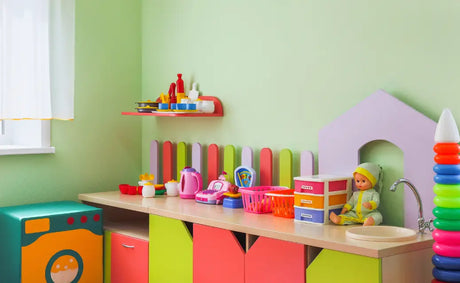What are Standardized Tests?
Standardized tests are important exams used in schools to measure how well students are learning and to help make decisions about their education. These tests can be used for things like college admissions or checking if students are on track in their grade level. Because these tests can have a big impact, it's normal for students to feel nervous about taking them.
Preparing well for standardized tests is key to doing your best and feeling less stressed. When students understand the material, get familiar with the test format, and practice managing their time, they can walk into the test feeling more confident and ready to succeed.
Using good strategies for test preparation is important for boosting a student's confidence and helping them do their best on test day. By following these tips and keeping a positive attitude, students can handle the challenges of standardized tests more easily and perform better.
Best Practice 1: Understand the Test Format and Content

Familiarize yourself with the Test Structure
Understanding the test format is crucial for effective preparation. Knowing the structure of the test, including the types of questions (e.g., multiple-choice, essays), timing, and sections, can significantly impact performance. Here’s why:
- Types of Questions: Familiarity with question types helps to approach each one with the right strategy. For example, knowing how multiple-choice questions are framed can guide him in eliminating incorrect options.
- Timing: Understanding the time allotted for each section allows to practice managing his time effectively. This ensures he doesn’t spend too long on any one question, reducing the risk of running out of time.
- Sections: Being aware of how the test is divided (e.g., reading, math, writing) helps in organizing study sessions to focus on each section’s requirements.
Review Test Content
Reviewing the specific content and skills that will be tested is essential for targeted preparation. Here’s how to effectively review:
- Use Official Test Guides: Official test guides provide accurate information about what will be covered. They often include sample questions and detailed explanations, which are invaluable for understanding test content.
- Practice Tests: Taking practice tests helps them get accustomed to the types of questions and the test’s overall format. This not only builds familiarity but also identifies areas where he may need additional practice.
- Study Plan: Based on the content areas and types of questions, create a study plan that allocates time for each subject. Focus on key areas highlighted in the test guides and adjust the plan as needed based on their progress.
Best Practice 2: Incorporate Practice Tests

Simulate Test Conditions
Taking full-length practice tests under timed conditions is a highly effective way to prepare for standardized tests. Here’s why this approach is beneficial:
- Realistic Experience: Simulating actual test conditions helps children become familiar with the test’s format, pacing, and stress levels. By practicing under similar circumstances, he can learn how to manage his time and maintain focus throughout the exam.
- Stress Management: Experiencing the test environment through practice tests allows them to adapt to the pressure and build confidence. This reduces test-day anxiety by making the real test feel like a more familiar situation.
Analyze Practice Test Results
Reviewing practice test results is important to understand where they are strong and where he needs more help. Here’s how to do it:
- Spot Strengths and Weaknesses: Look closely at the results to see where your child does well and where he struggles. Notice any patterns in the types of questions he finds difficult or sections where he needs more practice.
- Work on Weak Areas: Create strategies to help them improve in the areas where he struggles. This might include extra practice, reviewing study materials, or getting help from a teacher or tutor.
- Update the Study Plan: Use what you learn from the practice tests to change the study plan. Focus more on the weak areas and adjust the schedule to make sure they are prepared for all parts of the test.
Best Practice 3: Teach Test-Taking Strategies

Effective Test-Taking Techniques
Equipping your child with effective test-taking strategies can greatly enhance his performance. Here are some key techniques to teach him:
- Process of Elimination: For multiple-choice questions, encourage your child to eliminate incorrect options first. This increases the chances of selecting the correct answer from the remaining choices.
- Example: If a question asks about the causes of a historical event and he’s unsure, he can rule out options that are unrelated before choosing the best remaining answer.
- Time Management: Teach them to allocate his time wisely during the test. He should be aware of how much time to spend on each section and question.
- Example: If the test has 60 questions to be completed in 60 minutes, he should aim to spend about 1 minute per question, leaving some buffer time for review.
- Approach to Different Question Types:
- Multiple Choice: Read each question and all the answer choices carefully before selecting the best option.
- Essay Questions: Outline key points before writing. Ensure his response addresses all parts of the question and is well-organized.
- Short-Answer Questions: Provide clear and concise answers that directly respond to the question, avoiding unnecessary information.
Developing Test-Taking Skills
Teaching these strategies can boost their confidence and performance. Here’s how to integrate these skills into his study routine:
- Regular Practice: Incorporate test-taking strategies into regular lessons and study sessions. Practice using these techniques in mock tests or during homework to reinforce their use.
- Review and Reflect: After practice tests, review your child’s use of these strategies. Discuss what worked well and what could be improved. Reflecting on this can help him refine his approach.
- Encourage Confidence: Reinforce the idea that these strategies are tools to help him succeed. Building confidence in these techniques will reduce test anxiety and improve performance.
Best Practice 4: Encourage Regular and Consistent Study

Create a Study Schedule
Establishing a regular study schedule is crucial for effective preparation. Here’s how to create a plan that promotes consistent study habits:
- Regular Sessions: Set aside specific times each day for study. Consistent study periods help to develop a routine and ensure steady progress without overwhelming him at the last minute.
- Tip: Break study sessions into manageable chunks (e.g., 30-45 minutes) with short breaks in between. This approach helps improve focus and retention, reducing the need for last-minute cramming.
- Balanced Plan: Include a variety of study activities in the plan, such as review sessions, practice tests, and relaxation periods. Ensure that your child has time to revisit difficult topics, take practice tests to gauge progress, and relax to avoid burnout.
- Example: Schedule review sessions on Mondays and Wednesdays, practice tests on Fridays, and use weekends for relaxation or light review.
Maintain Motivation and Focus
Keeping motivated and focused throughout his preparation is key to his success. Here are some strategies to help:
- Set Achievable Goals: Break down study goals into smaller, achievable milestones. Celebrate reaching these milestones to keep motivated and engaged.
- Tip: Use a reward system where they earn a small reward for completing study goals, such as extra screen time or a favorite treat.
- Varied Study Methods: Incorporate different study methods to keep sessions interesting. Use flashcards, interactive apps, and group study sessions to make learning more engaging.
- Example: Mix in games, quizzes, and hands-on activities related to the study material to maintain interest.
- Support and Encouragement: Parental and teacher support plays a significant role in maintaining motivation. Provide regular encouragement, check in on their progress, and offer help with any challenges they face.
- Tip: Create a supportive study environment at home and maintain open communication with them about his study needs and concerns.
Best Practice 5: Address Test Anxiety and Stress

Recognize and Manage Anxiety
Test anxiety can be a significant barrier to performance, but there are effective strategies to manage it:
- Identify Sources of Anxiety: Common sources of test anxiety include fear of failure, pressure to perform well, and unfamiliarity with the test format. Recognizing these sources helps in addressing them directly.
- Relaxation Techniques: Teach relaxation techniques such as deep breathing exercises, progressive muscle relaxation, or visualization. These methods can help calm his nerves and improve his focus.
- Example: Practice deep breathing exercises before study sessions or test-taking to help reduce anxiety.
- Mindfulness and Positive Self-Talk: Encourage your child to use mindfulness techniques and positive self-talk. Mindfulness helps him stay present and focused, while positive self-talk can build confidence and counteract negative thoughts.
- Tip: Create affirmations or positive statements that can repeat to himself, such as “I am prepared and capable.”
- Supportive Environment: Create a study environment that is comfortable and free of distractions. Offer reassurance and support, and let them know that it’s okay to feel nervous and that he’s well-prepared.
- Example: Set up a quiet, with school essentials, and study space where they feel relaxed and focused.
Promote Healthy Habits
Maintaining healthy habits is crucial for managing stress and supporting overall well-being:
- Adequate Sleep: Ensure that they get sufficient sleep each night. A well-rested mind is more alert and better able to handle stress.
- Tip: Establish a consistent bedtime routine to help them wind down and get quality sleep.
- Balanced Diet: Encourage a balanced diet with nutritious foods that support brain function and energy levels. Avoid excessive sugar and caffeine, which can contribute to stress and affect concentration.
- Example: Include fruits, vegetables, whole grains, and lean proteins in their diet to keep them energized and focused.
- Physical Activity: Regular physical activity helps reduce stress and improve mood. Encourage them to engage in activities they enjoy, such as sports, biking, or playing outside.
- Tip: Schedule time for physical activity into his daily routine, aiming for at least 30 minutes of exercise most days.
Conclusion
To help them prepare well for standardized tests and succeed, here are five key practices to follow:
- Know the Test: Make sure they understand the test format and content. This will help reduce anxiety and improve performance.
- Use Practice Tests: Have them take practice tests under real test conditions. Review the results to see where he’s strong and where he can improve.
- Learn Test-Taking Strategies: Teach them techniques for handling different types of questions and managing time during the test.
- Study Regularly: Set up a consistent study schedule. Use various study methods and set achievable goals to keep him motivated.
- Manage Stress: Help them manage test anxiety with strategies to stay calm and promote healthy habits to support their well-being.
By using these best practices, educators, students, and parents can make test preparation more effective and less stressful. Regular practice, careful preparation, and a supportive environment are key to better test results.
Preparing for standardized tests is important for academic success and personal growth. By following these tips, you’ll help him build confidence, improve his performance, and approach tests with a positive attitude. Good preparation not only helps with test scores but also teaches valuable skills that will benefit throughout this education.
Need some school supplies? Browse our collection of back-to-school essentials to find everything you need for a successful year ahead.

















